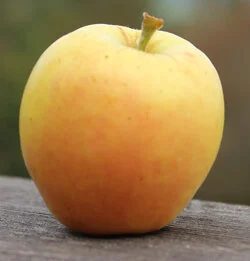Joybells
Why you should be excited
Joybells is from an era when apples could be appreciated for being subtle, unlike now, when it seems that everything must be 'explosive.'
The story of Joybells
Joan Morgan and Alison Richards describe Joybells as having a "delicate, almost ethereal taste."
When's the last time you tasted an apple that brought the word 'ethereal' to mind? Likely it wasn't one with a crunch so great it scares off birds roosting half a kilometre away. And that's the sort of apple that's in favour today.
Don't get me wrong: I love an apple with a good crunch. But I also really like the idea of paying enough attention to what we are eating that we notice delicate flavours as special as that of Joybells.
So here's to subtlety -- and to this not-so-famous English apple that inspired Morgan and Richards to describe it so nicely.
Joybells Facts
Its origins
Raised from seed in Surrey, England, sometime shortly before the turn of the 20th century.
Flavour, aroma, texture
The juicy, sweet, melting flesh delivers a delicate yet memorable flavour.
Appearance
This pretty apple is dusky pink with carmine stripes.
When they’re available
Mid-season (usually in late September).
Quality for fresh eating
Very good.
Quality for cooking
Mainly used for fresh eating.
Quality for cider
Not particularly known for its use in cider.
Keeping ability
Good (2 or 3 months when kept refrigerated).



